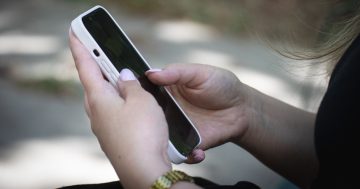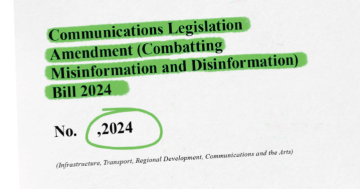
Legislation will be introduced to enforce a minimum age for access to social media. Photo: Region.
The Federal Government will introduce legislation ahead of the next election to impose and enforce a minimum age for access to social media.
The age is yet to be announced, but it looks set to be between 14 and 16 years of age.
Anthony Albanese said the government wants to wait to see the results of an age verification trial that is currently underway before it sets the limit.
“We know social media is causing social harm, and it is taking kids away from real friends and real experiences,” the Prime Minister said on Tuesday (10 September).
“Australian young people deserve better and I stand with them and with all Australian parents in protecting our kids.
“The safety and mental and physical health of our young people is paramount. We’re supporting parents and keeping kids safe by taking this action because enough is enough.”
Mr Albanese said legislation would be introduced to parliament this year. The next federal election is due by May next year.
Labor wants new laws to apply to set a minimum age for access to social media, as well as what it is describing as “other relevant digital platforms”, which is likely to mean online gaming.
Federal legislation will be informed by engagement with states and territories through the National Cabinet process and will draw upon recent work by former chief justice Robert French.
Mr French’s report was commissioned by South Australian Premier Peter Malinauskas, who favours setting the age at 14.
Federal Labor, however, may impose an even higher age of 15 or 16.
Mr Malinauskas said he wanted to see a legal framework in place across the country. He took the opportunity while in Canberra last week to brief the Prime Minister and other state and territory leaders on Mr French’s considerable work.
“The evidence is clear: social media is causing our children harm,” the South Australian Premier said.
“My intent is clear: we are going to do something about it.”
The French report runs to 276 pages and includes a proposed draft bill for South Australia to consider, but it could also be applied at the federal level.
The former chief justice said he hoped a nationally consistent approach would be pursued.
“The issue of protecting children from the harms of social media is one of global concern,” Mr French said.
“The proposed legislative model to give effect to a ban on access to social media by children under 14 and requiring parental consent for children aged 14 and 15 has regard to the complex and dynamic setting in which the law would operate.
“My hope is that South Australia’s initiative leads to a coherent national approach to this issue.”
The Prime Minister suggested there will be a national approach to the issue, and it will be led by the Federal Government, even though other states are already moving on the issue.
Describing it as an “important social issue”, the Prime Minister said introducing specific legislation will ensure Australian children are better protected from online harms and parents and carers are supported.
Opposition Leader Peter Dutton has previously announced Coalition policy to ban children and teenagers under 16 years of age from accessing social media.
He said if elected prime minister, he would use his first 100 days in office to introduce legislative bans.
“I think it’s best to look at it from a parent’s perspective, and parents want some rules in place,” Mr Dutton said in June.
Federal Communications Minister Michelle Rowland said the initiative will build on work already underway to address online harms for young people.
The $6.5 million age assurance trial, which is testing different implementation approaches to help inform policy design, is currently entering its final phase.
“As a mother of young daughters and Minister for Communications, I fully understand concerns around harmful online environments and addictive social media behaviour of children,” Ms Rowland said on Tuesday.
“Parents want real solutions and we are taking decisive action to identify and implement these very solutions to help ensure young people can use the internet in a safe and positive way that supports their learning and their lives.
“We are also holding big tech to account because platforms and online services have a key responsibility for the safety of their users.
“We will continue to engage experts, young people, advocates and parents through the age assurance trial, which is an important aspect of this journey.”



















